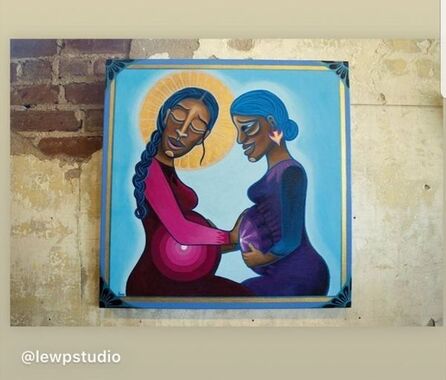 48% of the world's refugees are women and girls. *Source Women and girls who are refugees face a particular kind of vulnerability and violence. Rape is used as a terror tactic around the world and throughout history. In refugee camps in Bangladesh they are seeing up to 60 children born a day, because “an estimated 90% of female Rohingya refugees were raped during the Burmese Military takeover of Rakhine State around nine months ago.” This is a Crime Against Humanity to which the world must respond. **Source But it is important to emphasise that this is not the beginning or end of the story of refugee women and girls. It is too easy to simply highlight the dangers they are facing and to paint them solely as victims, or as problems to be sorted. Refugee women and girls are not “problems”. The Brave Global Campaign, an initiative to reach vulnerable girls around the world, affirms that “girls are the solution not the problem.” The Nativity Story illustrates this in a unique and surprising way. Most of us tend to skip over, or at least race through, the genealogies that are scattered throughout the Hebrew Scriptures. We don’t get them, the names are difficult to pronounce, and it seems difficult to extract any devotional meaning from them. We finally get to the New Testament, thrilled that these long incomprehensible lists are over and done with, but surprise! Matthew 1 kicks everything off with another recitation of begats and begots. Pay attention though, because this genealogy is strange. It includes women, which was not normal. In fact, it includes five women, four of whom are named, four of whom were “foreign”, and all of whom were tainted with some kind of sexual scandal. Tamar, Rahab, Ruth, Uriah’s wife (Bathsheba, so scandalous they could not even write out the name) and Mary. All women included and essential to the story of Jesus, just as the women he interacts with during his life are included and essential. In certain histories of Israel these women would be highlighted as part of the problem to be fixed, but here they are part of the solution. The line from Abraham to David to Jesus does not happen without them. Women are front and central, Scripture is saying, in the Gospel story of Jesus. We can help change the narrative around refugee women and girls from that of “victims” to that of “brave”, “strong,” “resilient”, “creative”, “wise” and “essential”. They are not the problem, they are the solution to the problem, so let’s learn to think and act that way. Read: Matthew 1:1-17. Consider looking up the individual stories of the women in the genealogy as well. Prayer: Pray for the women and girls in your life, thanking God for them. Pray for the Rohingya women in the camps. Pray for the forcibly displaced Acholi and South Sudanese women I Live Again Uganda is ministering to, as they deal with Covid-related shutdowns, increasing the danger of gender-based violence at home. And read here a story of refugee women in Kenya who are very clearly part of the solution.
0 Comments
Your comment will be posted after it is approved.
Leave a Reply. |
WELCOME!
Our vision is to help people survive and recover from forced displacement. We do this together with the church, both globally, and locally in Canada. Archives
May 2024
Categories |
ABOUT IAFR.CA |
OPPORTUNITIES |
AFFILIATES
|
CONTACTIAFR Canada
374 Sheppard Ave E Toronto, ON M2N 3B6 [email protected] Please Note: IAFR Canada does not sponsor people to resettle in Canada. You may want to contact one of Canada's sponsorship agreement holders. |
|
*IAFR Canada is a distinct organization from IAFR USA
All photos on this website are by IAFR unless otherwise noted |
© 2020 International Association For Refugees Canada

 RSS Feed
RSS Feed